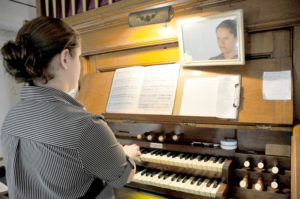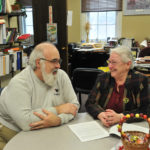By Lindsay Steele
The Catholic Messenger
When Travis Crowe stepped into the chapel at Concordia University in Michigan for the first time and looked up at the massive pipe organ, the long-time pianist was in awe. The 18-year-old college student immediately signed up for lessons. “I knew I wanted to learn the organ.”

Colleen Tague, 23, practices on the organ at St. Joseph Parish in DeWitt Feb. 8. Though the organ has fallen in popularity in recent years, Tague is one of a number of young adult organists embracing the old instrument.
Now a 20-year-old college graduate and a candidate in the Rite of Christian Initiation of Adults, he recently started playing organ for Our Lady of the River Parish in LeClaire. Though the organ has fallen in popularity in recent years, he is among a small group of young organists in the diocese who have fallen in love with playing the church’s traditional instrument.
“It’s like painting a picture with sound,” Crowe said. “You can have trumpet (stops) going for an Easter hymn, or a somber tone for a funeral. You can have people feel different ways with the different sounds it can make.”
His interest, and that of other young organists, goes against a general trend toward piano and other instruments for Catholic worship. Before Vatican II, the only way a young person could accompany Mass instrumentally was to play the organ; at the time, as it was the only universally accepted instrument in the Catholic Church. While the Vatican II document identified the organ as the premier instrument of the church, it also opened the door to new musical styles.
Two generations removed, parish music directors say fewer people play organ. Some diocesan parishes no longer use organs during Mass.
Deacon Frank Agnoli, diocesan director of liturgy, said that although the organ is in theory a highly esteemed instrument, in practice, many parishes have moved to other instruments for a majority of worship situations. “Therefore, in most places, the lack of persons able to play the pipe organ well is not an urgent matter. It may be a matter of desire, but not urgency.”
Colleen Tague, 23, a recent graduate of Waverly’s Wartburg College Church Music Program, said, “Due to cultural shifts, the art of organ playing has fallen off as trained organists get older.” A trained organist herself, Tague accompanies funeral and wedding Masses at parishes in DeWitt and Grand Mound. She also serves as choir director for Jesus Christ, Prince of Peace Parish in Clinton.
Like Tague, Crowe is an exception to the cultural shift. He assists with accompaniment responsibilities at Our Lady of the River and hopes to share his talents with other diocesan parishes whenever he can.
Since every organ has variances — some have curved pedals, some straight, and mechanisms can differ – practicing can be a bit of a challenge. He practices as much as he can on his home organ and then practices on the parish organ before Mass to gain comfort and familiarity. The variances, while sometimes inconvenient, are also what keep him interested. “It’s like being a (car enthusiast). Some cars are old and historic, and then others may be more modern. There is joy in being able to experience many different organs.”
Crowe is not alone in his interest. Tague said an increasing number of persons under age 35 seem to be passionate about the organ, especially in and around colleges with organ programs. “Young people today crave a physical worship experience.… Aside from requiring physical effort on the part of the organist, the experience for the listeners is also physical. The resonance of an organ through the building continues through the seats and into the very hearts of its listeners.”
Jacob Bancks, 32, an organist for St. Paul the Apostle Parish in Davenport, has also noticed more young adults, like himself, showing interest in the organ. “I think it fits into a larger trend of a greater openness of younger Catholics to certain older traditions. For some with no lived experience of pre-conciliar worship, things like the organ … have an almost mystical allure.”
Crowe would love to see young adult interest translate into lessons and an interest in playing for parishes. “I hope that others in our generation will come up and continue playing organ and that it won’t fall into disuse. I hope that people will see the value of the organ, especially in church music.”
Tague said, “It has an asset that cannot be replaced.”











